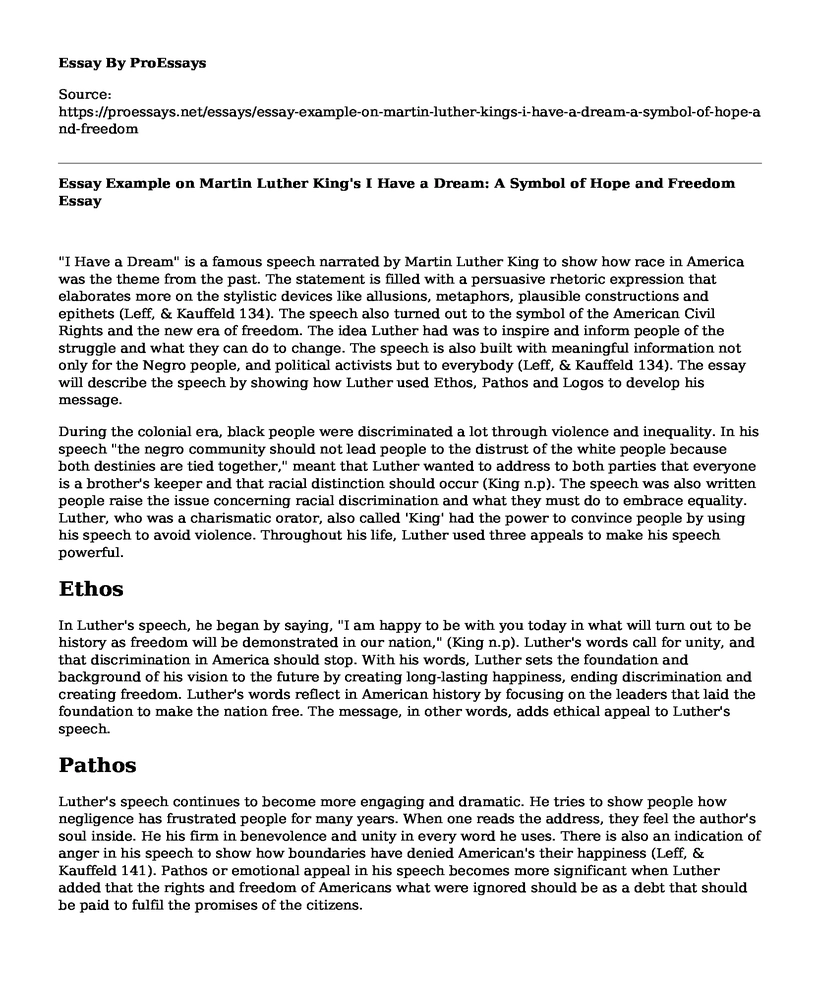"I Have a Dream" is a famous speech narrated by Martin Luther King to show how race in America was the theme from the past. The statement is filled with a persuasive rhetoric expression that elaborates more on the stylistic devices like allusions, metaphors, plausible constructions and epithets (Leff, & Kauffeld 134). The speech also turned out to the symbol of the American Civil Rights and the new era of freedom. The idea Luther had was to inspire and inform people of the struggle and what they can do to change. The speech is also built with meaningful information not only for the Negro people, and political activists but to everybody (Leff, & Kauffeld 134). The essay will describe the speech by showing how Luther used Ethos, Pathos and Logos to develop his message.
During the colonial era, black people were discriminated a lot through violence and inequality. In his speech "the negro community should not lead people to the distrust of the white people because both destinies are tied together," meant that Luther wanted to address to both parties that everyone is a brother's keeper and that racial distinction should occur (King n.p). The speech was also written people raise the issue concerning racial discrimination and what they must do to embrace equality. Luther, who was a charismatic orator, also called 'King' had the power to convince people by using his speech to avoid violence. Throughout his life, Luther used three appeals to make his speech powerful.
Ethos
In Luther's speech, he began by saying, "I am happy to be with you today in what will turn out to be history as freedom will be demonstrated in our nation," (King n.p). Luther's words call for unity, and that discrimination in America should stop. With his words, Luther sets the foundation and background of his vision to the future by creating long-lasting happiness, ending discrimination and creating freedom. Luther's words reflect in American history by focusing on the leaders that laid the foundation to make the nation free. The message, in other words, adds ethical appeal to Luther's speech.
Pathos
Luther's speech continues to become more engaging and dramatic. He tries to show people how negligence has frustrated people for many years. When one reads the address, they feel the author's soul inside. He his firm in benevolence and unity in every word he uses. There is also an indication of anger in his speech to show how boundaries have denied American's their happiness (Leff, & Kauffeld 141). Pathos or emotional appeal in his speech becomes more significant when Luther added that the rights and freedom of Americans what were ignored should be as a debt that should be paid to fulfil the promises of the citizens.
Logos
Luther's dream was of perfect unity, brotherhood and equality. Millions of people shared and loved his goal. However, Luther desired to cover his thoughts faster, and that is why he spoke of how the Black community loses a lot and yet America promised equality to everyone. He uses America's history to raise facts on how a peaceful method can end the misery in people's lives and end violence. One example is when he says 'five score years ago,' to show that the change would have happened a long time ago (Leff, & Kauffeld 147). Luther also talks about 'hundred years later' to show that the blacks have been discriminated for too long and waiting are utterly painful.
Conclusion
Even though the speech is splendid by the use of provoking phrases and imagery, it is also high in emotions. Luther never wanted the black community to give up on fighting for freedom. He also wanted them to have the same rights as whites. However, he was meticulous not to make the protestors to turn out violent. Many years have passed by since Luther talked about passion for encouraging the African Americans that still go through struggles. Even though they went through a hard time, Luther desired to equalize everyone in the American Society.
Works Cited
Leff, Michael C., & Kauffeld, Fred J. Texts in context: critical dialogues on significant episodes in American political rhetoric. (1989). Davis: RoutledgeKing, Martin Luther. I Have a Dream. American Rhetoric. 12th July 1989. https://americanrhetoric.com/speeches/mlkihaveadream.htm
Cite this page
Essay Example on Martin Luther King's I Have a Dream: A Symbol of Hope and Freedom. (2023, Apr 24). Retrieved from https://proessays.net/essays/essay-example-on-martin-luther-kings-i-have-a-dream-a-symbol-of-hope-and-freedom
If you are the original author of this essay and no longer wish to have it published on the ProEssays website, please click below to request its removal:
- Rhetorical Analysis of the Martin Luther King Jr's Speech "I Have a Dream"
- Rhetorical Analysis of President Barack Obama's Second Inaugural Address
- Criminology Theory Application: Millers Vs. Howard
- Global Outsourcing, Social Media, and the Redefinition of Labor Essay
- Essay Example on Understanding the Difference Between Culture and Fashion
- Essay Example on America's Got Talent: Platform for Talented Performers to Shine
- Pretty Hurts: Analyzing Beyonce Knowles' 2013 Music Video - Essay Sample







